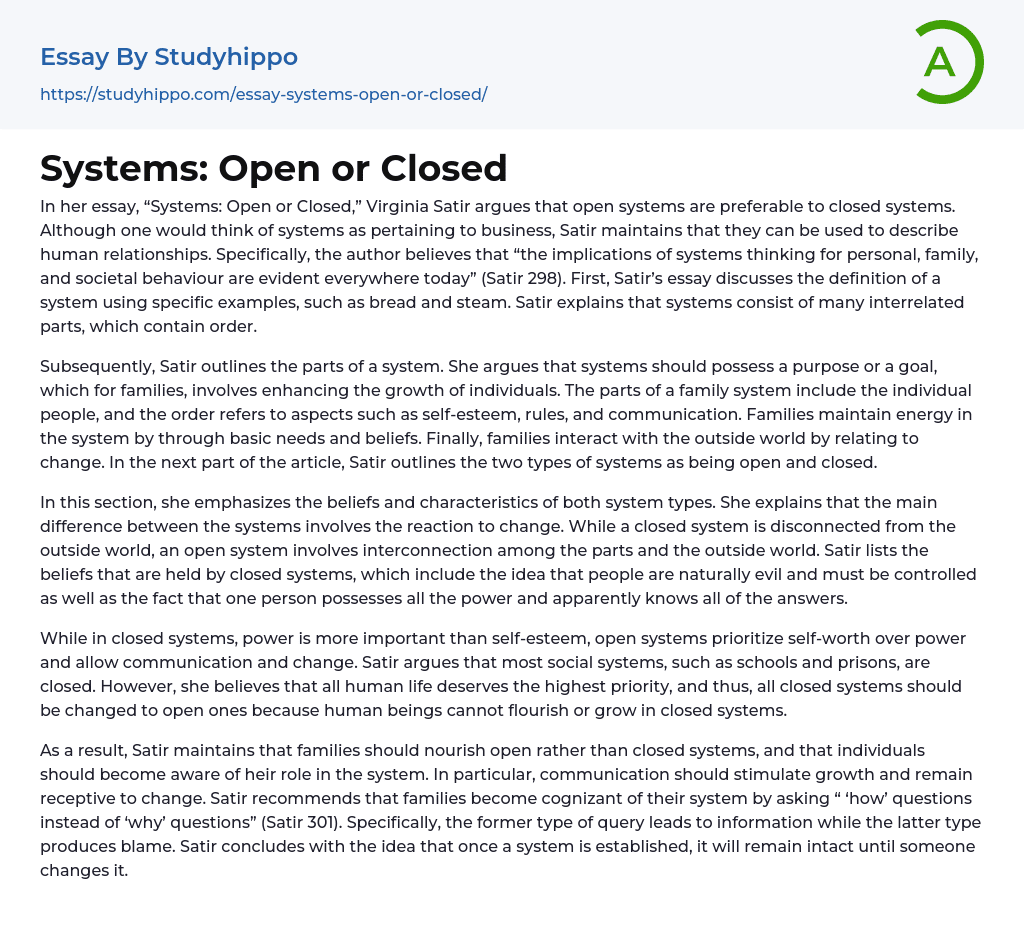In her essay, “Systems: Open or Closed,” Virginia Satir argues that open systems are preferable to closed systems. Although one would think of systems as pertaining to business, Satir maintains that they can be used to describe human relationships. Specifically, the author believes that “the implications of systems thinking for personal, family, and societal behaviour are evident everywhere today” (Satir 298). First, Satir’s essay discusses the definition of a system using specific examples, such as bread and steam. Satir explains that systems consist of many interrelated parts, which contain order.
Subsequently, Satir outlines the parts of a system. She argues that systems should possess a purpose or a goal, which for families, involves enhancing the growth of individuals. The parts of a family system include the individu
...al people, and the order refers to aspects such as self-esteem, rules, and communication. Families maintain energy in the system by through basic needs and beliefs. Finally, families interact with the outside world by relating to change. In the next part of the article, Satir outlines the two types of systems as being open and closed.
In this section, she emphasizes the beliefs and characteristics of both system types. She explains that the main difference between the systems involves the reaction to change. While a closed system is disconnected from the outside world, an open system involves interconnection among the parts and the outside world. Satir lists the beliefs that are held by closed systems, which include the idea that people are naturally evil and must be controlled as well as the fact that one person possesses all the power and apparently knows all o
the answers.
While in closed systems, power is more important than self-esteem, open systems prioritize self-worth over power and allow communication and change. Satir argues that most social systems, such as schools and prisons, are closed. However, she believes that all human life deserves the highest priority, and thus, all closed systems should be changed to open ones because human beings cannot flourish or grow in closed systems.
As a result, Satir maintains that families should nourish open rather than closed systems, and that individuals should become aware of heir role in the system. In particular, communication should stimulate growth and remain receptive to change. Satir recommends that families become cognizant of their system by asking “ ‘how’ questions instead of ‘why’ questions” (Satir 301). Specifically, the former type of query leads to information while the latter type produces blame. Satir concludes with the idea that once a system is established, it will remain intact until someone changes it.
- Self Assessment essays
- Self Evaluation essays
- Immigration Reform essays
- Belief essays
- Deontology essays
- Ethical dilemma essays
- Moral essays
- Normative Ethics essays
- Values of Life essays
- Virtue essays
- Virtue Ethics essays
- Work Ethic essays
- John Locke essays
- 9/11 essays
- A Good Teacher essays
- A Healthy Diet essays
- A Modest Proposal essays
- A&P essays
- Academic Achievement essays
- Achievement essays
- Achieving goals essays
- Admission essays
- Advantages And Disadvantages Of Internet essays
- Alcoholic drinks essays
- Ammonia essays
- Analytical essays
- Ancient Olympic Games essays
- APA essays
- Arabian Peninsula essays
- Argument essays
- Argumentative essays
- Art essays
- Atlantic Ocean essays
- Auto-ethnography essays
- Autobiography essays
- Ballad essays
- Batman essays
- Binge Eating essays
- Black Power Movement essays
- Blogger essays
- Body Mass Index essays
- Book I Want a Wife essays
- Boycott essays
- Breastfeeding essays
- Bulimia Nervosa essays
- Business essays
- Business Process essays
- Canterbury essays
- Carbonate essays
- Catalina de Erauso essays




